tummy hurts
Diverticulitis & Diverticulosis
Nutritional Supplements Can Help Relieve Symptoms and Consequences of Diverticulitis
by Ladd McNamara, M.D.
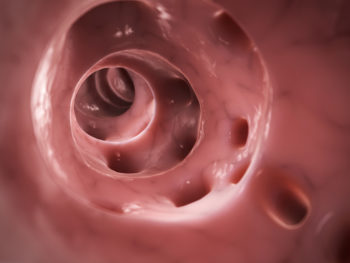 The article and protocol are for informational purposes only, and not intended as medical advice. Please read the Medical Disclaimer below, and consult with your personal physician before starting supplements and acting upon any information on this website.
The article and protocol are for informational purposes only, and not intended as medical advice. Please read the Medical Disclaimer below, and consult with your personal physician before starting supplements and acting upon any information on this website.
Discussion
Diverticulitis is a condition of infection and inflammation of diverticulosis. Diverticulosis is a condition of the large intestine in which there are several small (marble-sized) bulging pouches, or herniated pockets, in the intestinal wall.
The protruding pockets are known as diverticula and are common after the age of 40. They develop in naturally weak areas of the intestine, with some people being more prone to it than others. Under pressure (holding in of gas and stool when needing to go), the weakened areas stretch and herniate past the point of recovery.
More than “holding gas in,” the greatest risk factors for diverticulosis/diverticulitis is obesity, poor diet (high in animal fat, low in fiber), smoking, and opioid and NSAID use. (NSAID is non-steroidal anti-inflammatory drugs; such as ibuprofen, naproxen, etc.)
Diverticula usually do not cause problems, and a person may not even know they have this issue until a routine screening colonoscopy is performed. However, about 20% of those with diverticulosis develop symptoms, usually constipation or diarrhea, along with abdominal pain, like those of irritable bowel syndrome. Often a patient is diagnosed with irritable bowel syndrome until a barium enema with x-ray or a colonoscopy is used to make the correct diagnosis.
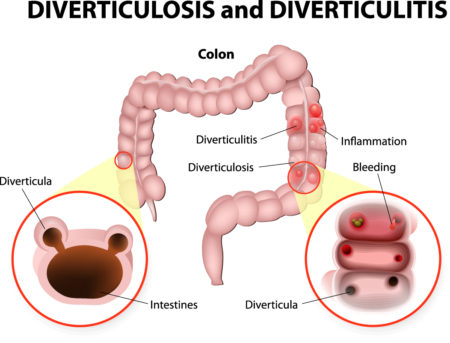
When stool gets clumped in the pockets, as is often the case, one or more of the diverticula might become infected and inflamed. This is now diverticulitis, and it can become a very serious condition, much like appendicitis.
Within the herniated diverticula, the bowel wall is thinner than the wall of the large intestine, making it more susceptible to infection from the trillions of bacteria that reside in the colon. Some bacterial strains are more virulent and damaging than the good bacteria within the bowel, which is why it is good to take a quality probiotic daily. This helps balance the bacteria in favor of the good bacteria that helps support the health of the colon, as well as supports the immune system, brain, and skin.
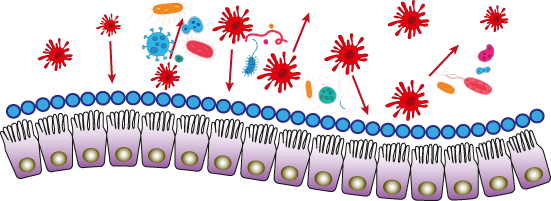 White blood cells, including macrophages, cytotoxic T cells, and natural killer cells are found in the lining of the bowel, just under the epithelial lining. They continually kill off bacteria that happen to make it across the epithelial lining in order to prevent an infection. When the immune system is suppressed due to viral infections, stress, or lack of adequate micronutrient intake, bacteria can spread in the intestinal wall and cause an infection and inflammation. This leads to fever, pain, cramping, and constipation or diarrhea. This is very similar to appendicitis, but the pain is located on the left side of the abdomen, opposite that of appendicitis.
White blood cells, including macrophages, cytotoxic T cells, and natural killer cells are found in the lining of the bowel, just under the epithelial lining. They continually kill off bacteria that happen to make it across the epithelial lining in order to prevent an infection. When the immune system is suppressed due to viral infections, stress, or lack of adequate micronutrient intake, bacteria can spread in the intestinal wall and cause an infection and inflammation. This leads to fever, pain, cramping, and constipation or diarrhea. This is very similar to appendicitis, but the pain is located on the left side of the abdomen, opposite that of appendicitis.
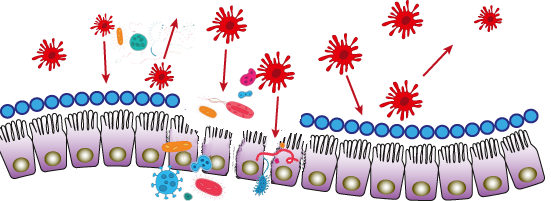
And as with appendicitis, a flare-up of diverticulitis can also cause nausea, vomiting, and a loss of appetite.
Management of Diverticulosis
How many diverticula are involved and how severe the infection is will determine the management and treatment. Mild diverticulitis can be managed with oral antibiotics, rest, dietary changes, probiotics, and fiber. Severe infections will require hospitalization and IV antibiotics.
For recurrent bouts of severe diverticulitis, surgical removal of the affected colon may be required to avoid possible future rupture of a diverticula leading to sepsis, a life-threatening situation. A ruptured diverticula is just as serious as a ruptured appendix.
Depending upon how much of the colon is removed, chronic loose stools and diarrhea may occur, because a major function of the large intestine is water resorption. Also, the sigmoid colon acts as a holding area for the stool until one has an opportune time to evacuate the bowel. With the sigmoid colon removed, one may have an urgency to defecate, causing some lifestyle adjustments.
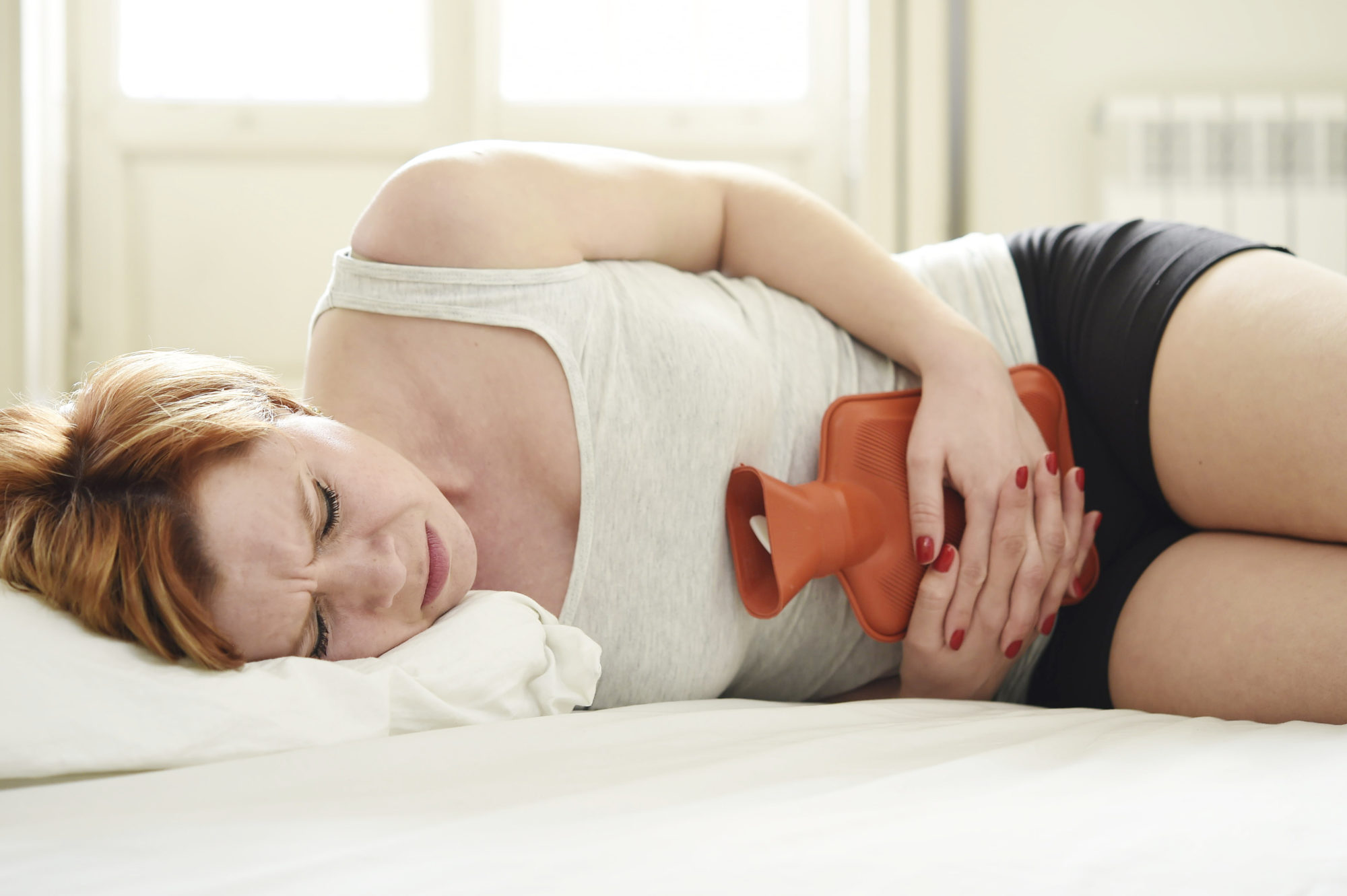 The lifestyle adjustments may be a hassle, and surgery is not without its risks, but a ruptured, or severely infected diverticula, is a very serious situation. The situation must be weighed out, and a thorough discussion with one’s doctor must determine which is best: surgical removal of the affected large intestine, or expectant management.
The lifestyle adjustments may be a hassle, and surgery is not without its risks, but a ruptured, or severely infected diverticula, is a very serious situation. The situation must be weighed out, and a thorough discussion with one’s doctor must determine which is best: surgical removal of the affected large intestine, or expectant management.
If expectant management is the course, then nutritional supplements must be considered. Supplements not only help reduce inflammation; they also can establish a healthy microbiome (the bacteria population of the bowel), and support a healthy immune system to better defend the intestinal wall from infection.
Fiber Supplementation
Soluble and insoluble fiber helps to keep the stool contents moving, reducing sludge and clumping. It may not be a bad idea for a person with a history of diverticulitis to have a daily intake of up to 40 grams of fiber per day. The average American diet is 15 grams/day. Therefore, supplementing with at least 25 grams of a good fiber drink of BOTH soluble and insoluble fiber blend is highly recommended.
 Cutting down on gas production is important to reduce pressure in the bowel. Beans, including soy protein (soybean) have sugar starch, which is taken up by bacteria in the bowel, which then release gas, which accumulates, making the person gassy. Supplemental enzymes are available in specific products, such as Beano, which provides the enzyme (alpha galactosidase) to break down these sugars. (Not all digestive enzyme products provide galactosidase enzyme.)
Cutting down on gas production is important to reduce pressure in the bowel. Beans, including soy protein (soybean) have sugar starch, which is taken up by bacteria in the bowel, which then release gas, which accumulates, making the person gassy. Supplemental enzymes are available in specific products, such as Beano, which provides the enzyme (alpha galactosidase) to break down these sugars. (Not all digestive enzyme products provide galactosidase enzyme.)
In addition to supplementing with alpha galactosidase enzyme prior to any consumption of bean products, other enzymes that break down other carbohydrates (sugars), fats, and proteins should be used prior to meals so that more complete digestion and absorption of nutrients take place.
Included in a digestive enzyme that I recommend is artichoke extract, which helps the liver produce and release bile and helps with bowel motility and digestion.
Probiotics are Critical for Healing the Gut
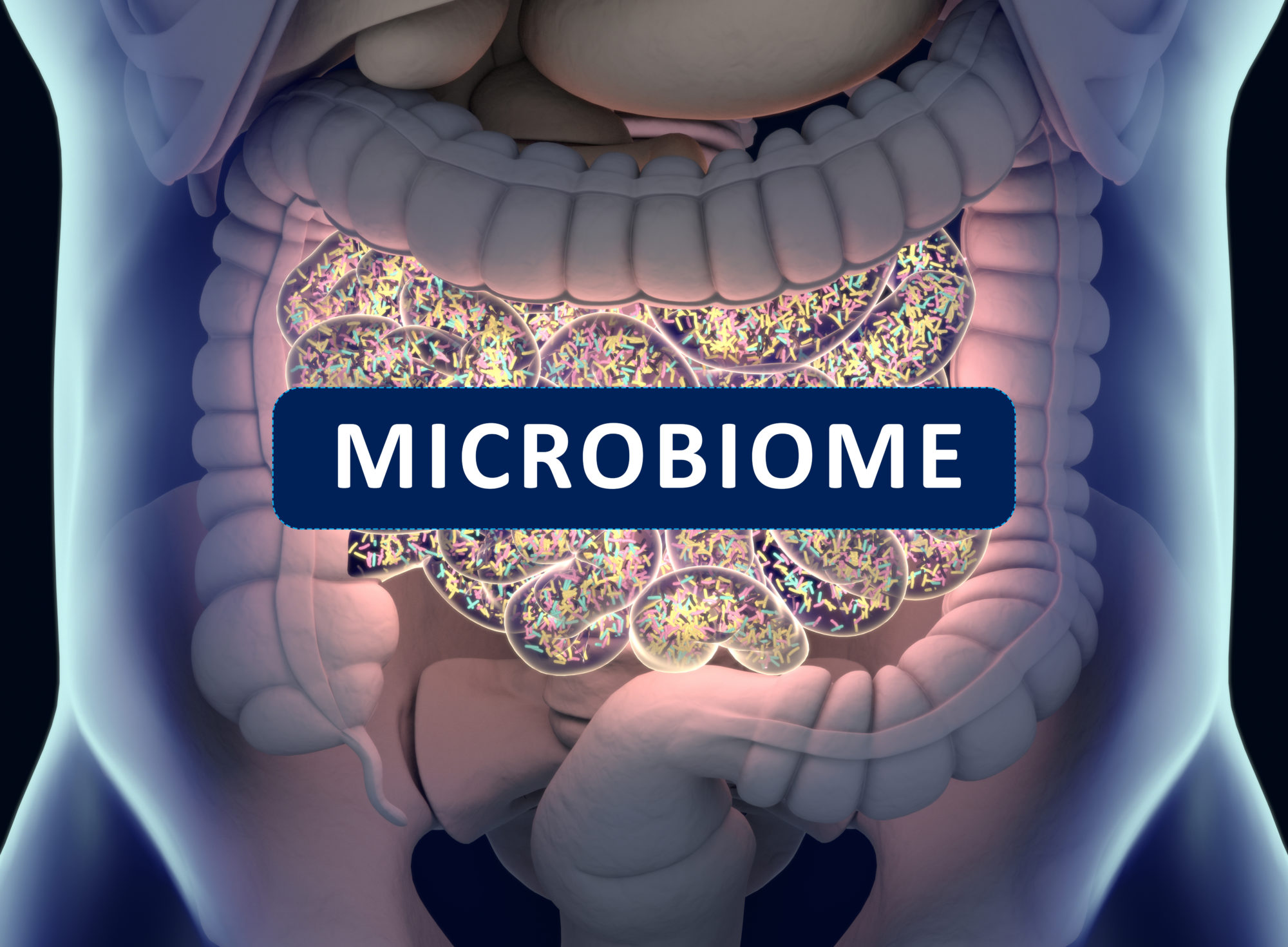 The microbiome of the gut can be considered another organ of the body. Weighing nearly three pounds and numbering in the 50 – 100 trillion range, this diverse species of bacteria is considered the ‘rain forest’ of the body. In order to maintain a healthy digestive tract and proper digestion, we have a symbiotic relationship with an intricate balance of friendly bacteria.
The microbiome of the gut can be considered another organ of the body. Weighing nearly three pounds and numbering in the 50 – 100 trillion range, this diverse species of bacteria is considered the ‘rain forest’ of the body. In order to maintain a healthy digestive tract and proper digestion, we have a symbiotic relationship with an intricate balance of friendly bacteria.
The microbiome plays a much larger role than just assisting digestion. It is a key component in maintaining a healthy immune system, producing serotonin for mood enhancement, and even helping to maintain healthy skin.
Antibiotics, eating unhealthy foods, stress, lack of sleep, coffee, alcohol, lack of hormones, and many other factors can alter the balance of bacteria in the bowel.
If the bacteria are unbalanced with more bad bacteria than friendly bacteria, the bad bacteria can make their way beneath the hyper-permeable epithelial layer within the thinned out area of the diverticula and trigger inflammation and infection. Low-grade inflammation and altered intestinal microbiota have been identified as factors contributing to abdominal symptoms. (1)
Although the evidence that probiotics alone can improve diverticulitis is scant, it is an important component of the whole protocol. Improving the intestinal microbiome by supplementation with probiotics is a critical component for the treatment and management of bowel health, whether it is Crohn’s disease, ulcerative colitis, irritable bowel syndrome, or diverticulitis. (2, 3)
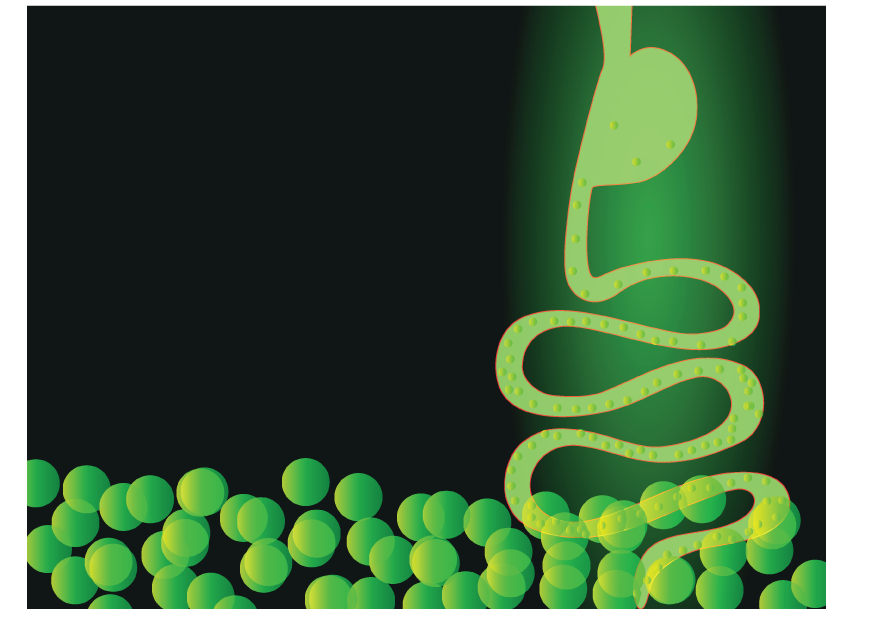 Probiotics alone are not enough to reduce the symptoms of diverticulitis, but they are an important supplement to use to maintain balance of the microbiome.
Probiotics alone are not enough to reduce the symptoms of diverticulitis, but they are an important supplement to use to maintain balance of the microbiome.
In my protocol, I recommend probiotic strains which scientific studies have backed as the two most important strains to replace for establishing a foundation for growth of numerous other bacterial strains; Lactobacillus rhamnosus LGG, and Bifidobacterium BB-12.
Numerous probiotic strains are available, many of which have very little-to-no clinical data regarding their benefit or physiological activity. These two strains have had numerous human trials proving viability and benefit in humans. They are designed for long shelf-life, and importantly, to withstand the harsh acidic environment of the stomach, so they can pass into the intestines intact, where they multiply and create a healthy environment for the microbiome to flourish.
Probiotics help heal the hyper-permeable intestinal lining, which reduces inflammation and immune activation.
Vitamin D
 There is a vitamin D deficiency epidemic in the U.S. and Canada, and many other countries as well. Most people are deficient in vitamin D, and boosting one’s vitamin D can significantly reduce the risk of many chronic degenerative diseases, including diverticulitis. (4) Similarly, those with diverticulosis can benefit by boosting vitamin D levels. One study among 10,000 patients with diverticular disease found that those with higher vitamin D blood levels had less diverticulitis. (5) The severity of diverticulitis was found to be less as seen on colonoscopy among patients with higher vitamin D levels. (6)
There is a vitamin D deficiency epidemic in the U.S. and Canada, and many other countries as well. Most people are deficient in vitamin D, and boosting one’s vitamin D can significantly reduce the risk of many chronic degenerative diseases, including diverticulitis. (4) Similarly, those with diverticulosis can benefit by boosting vitamin D levels. One study among 10,000 patients with diverticular disease found that those with higher vitamin D blood levels had less diverticulitis. (5) The severity of diverticulitis was found to be less as seen on colonoscopy among patients with higher vitamin D levels. (6)
One’s doctor can check the vitamin D status with a blood test for 25-hydroxy-vitamin D3 (25-OH-D3). Most doctors will aim for a level of 40 – 50 ng/ml. More progressive doctors, and vitamin D experts will recommend higher levels, on the order of 60 – 80 ng/ml. This often requires the intake of 4000 – 8000 IU of vitamin D3/day.
Studies have shown that there is no toxicity of vitamin D3 up to 10,000 IU per day, and possibly higher. The most important aspect of vitamin D supplementation is the blood test; checking the level of 25-OH vitamin D3. It should not exceed 100 ng/ml, because some people who greatly exceed 100 ng/ml can develop atrial fibrillation. Most do not, but some can. No one has ever been found to develop atrial fibrillation from a vitamin D level up to 100 ng/ml.
My protocol includes doses of 4000 – 8000 IU/day; but it is up to the individual to work with their doctor to make sure their vitamin D level (25-OH vitamin D3) is between 50 – 100 ng/ml (aiming for 75 ng/ml ± 15 ng/ml).
Reduce Inflammation of Diverticula and Boost Immunity
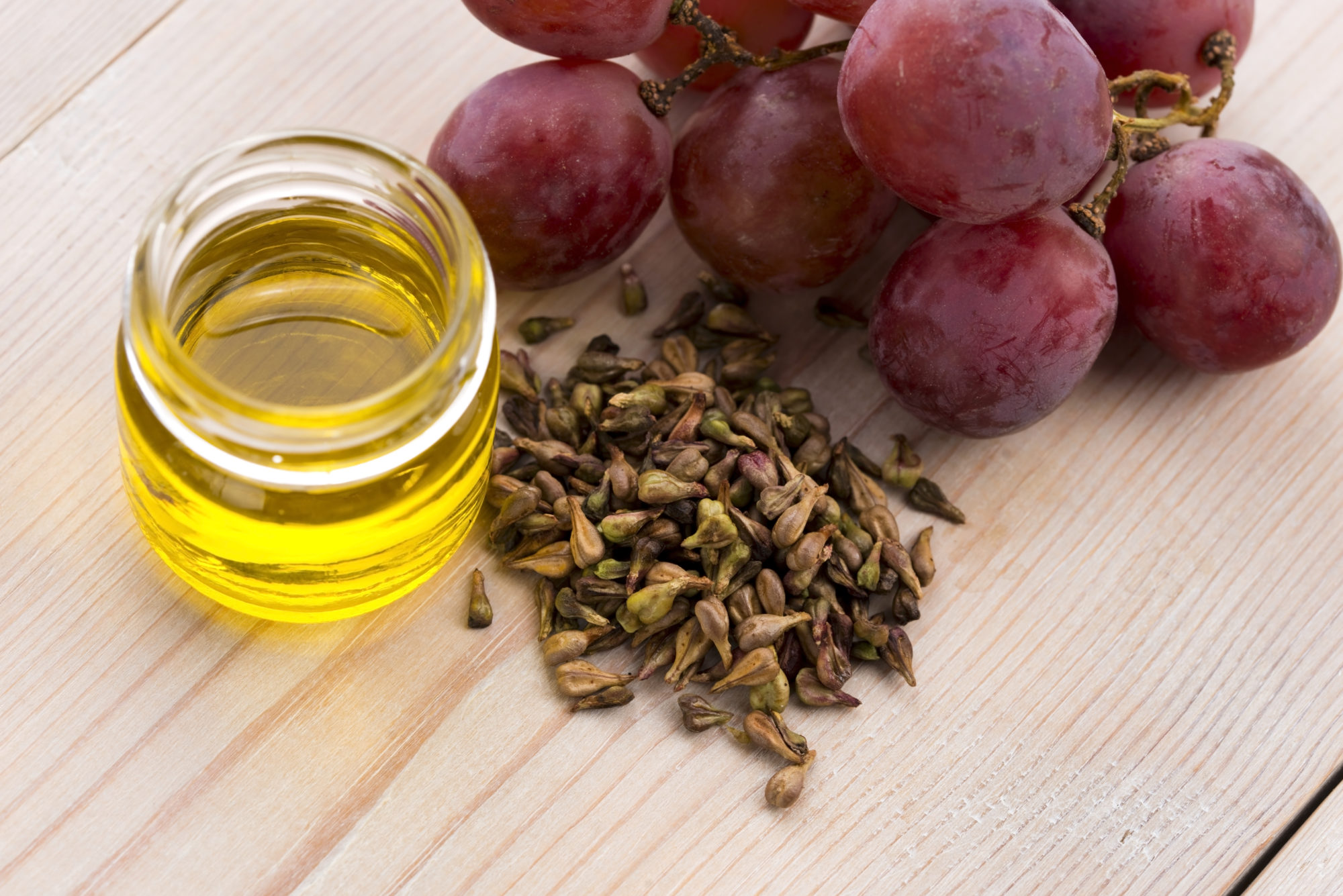 To reduce recurrent bouts of diverticulitis, often an anti-inflammatory drug, such as 5-aminosalicylic acid (5-ASA) (e,g,, mesalazine, mesalamine), is employed. As with all drugs, it is not without its side-effects. I prefer antioxidants that have an anti-inflammatory effect, which do not have the negative side-effects of the drugs.
To reduce recurrent bouts of diverticulitis, often an anti-inflammatory drug, such as 5-aminosalicylic acid (5-ASA) (e,g,, mesalazine, mesalamine), is employed. As with all drugs, it is not without its side-effects. I prefer antioxidants that have an anti-inflammatory effect, which do not have the negative side-effects of the drugs.
To reduce inflammation of the diverticula, antioxidants such as grape seed extract, resveratrol, and turmeric extract (curcumin) block the Cox 2 enzyme involved in the inflammatory process. (7, 8) Resveratrol works synergistically with the other antioxidants to reduce inflammation via inhibition of white blood cells (granulocytes and monocytes) and stimulation of Nrf2 protein to transcribe additional endogenous antioxidant enzymes. (9, 10)
These antioxidants are both safe and effective. They do not have the consequences of gastritis or kidney damage as do the Non-Steroidal Anti-Inflammatory Drugs (NSAIDs). There is no toxic dose to these antioxidants, and the dose can be safely increased to help reduce inflammation and pain. They also stimulate healing as they protect against inflammation.
Cigarette smoking, a poor diet, and obesity all increase oxidative damage and inflammation. Inflammation from any source increases the risk of diverticulitis. It is clear that any risk factor that increases inflammation must be eliminated. Even non-smokers and normal weight people get diverticulitis. Avoiding excessive oxidation and inflammation is important, but of critical importance is to increase the antidote to oxidation and inflammation by supplementing with a wide range of various antioxidants. Many antioxidants also reduce inflammation, both directly and indirectly.
Other Micronutrients
Vitamin E is an antioxidant with anti-inflammatory properties. Researchers have found an association of low vitamin E blood levels with higher incidences of gastrointestinal diseases. (11) Vitamin C is beneficial to collagen production, which is an important component of intestinal wall integrity. It is also a powerful antioxidant and works synergistically with vitamin E and grape seed extract.
Healthy, Functional Mitochondria
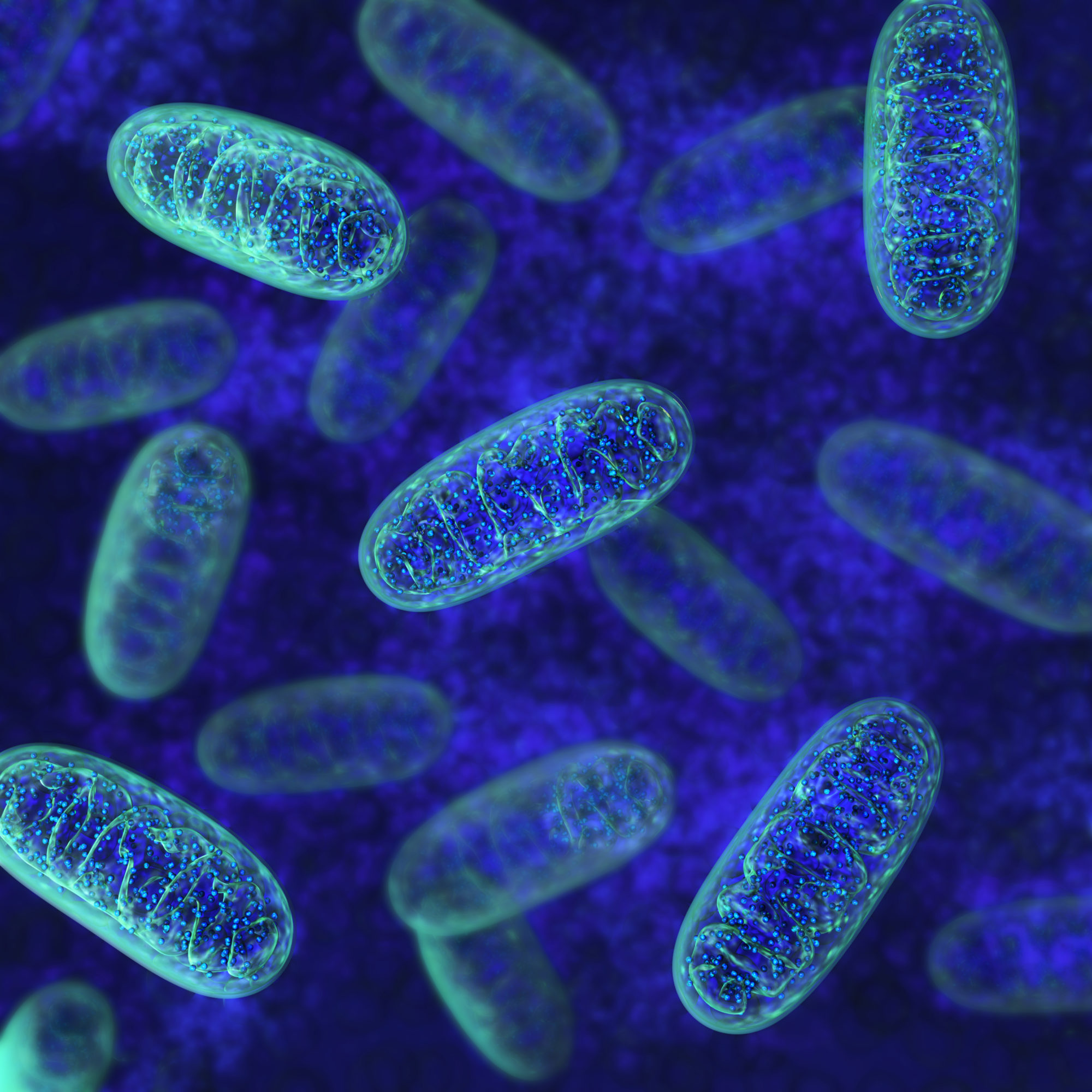 Co-enzyme Q10 (co-Q10) is used in the mitochondria of cells. Co-Q10 is a vitamin antioxidant used throughout the body within the cellular mitochondria. Mitochondria are the powerhouses, the “engines” of cells. They convert sugar and fats into ATP, energy molecules. Without ATP, the cells cannot function, cannot produce proteins or enzymes; they cannot repair themselves. Without ATP from the mitochondria, the immune system cannot function. Not one nerve could fire; not one muscle cell could contract without ATP.
Co-enzyme Q10 (co-Q10) is used in the mitochondria of cells. Co-Q10 is a vitamin antioxidant used throughout the body within the cellular mitochondria. Mitochondria are the powerhouses, the “engines” of cells. They convert sugar and fats into ATP, energy molecules. Without ATP, the cells cannot function, cannot produce proteins or enzymes; they cannot repair themselves. Without ATP from the mitochondria, the immune system cannot function. Not one nerve could fire; not one muscle cell could contract without ATP.
Nearly every age-related disease process, including diverticulosis/diverticulitis involves dysfunction and decay of mitochondria. As the mitochondria wear down, the ability of the cells decline, and age. With aging, organs and tissues wear out. Herniation of the intestinal wall is more likely because it is aged and damaged.
Taking supplements with bio-technology that signals the inherent intelligence of the cell’s DNA to renew endogenous antioxidant enzymes that protect the mitochondria, as well as stimulate the mitochondria to recycle and renew themselves is a powerful way to regenerate cells and tissues to act, and actually be younger. Cells can regenerate if given the proper environment and nutrients to do so.
The combination of micronutrients in the vitamin-antioxidant tablets signal this cell renewal via the renewal of mitochondria. Additionally, co-enzyme Q10, along with alpha lipoic acid and magnesium are required for mitochondrial function. These nutrients help the intestinal wall heal. It cannot get rid of the diverticula, as that is a structural effect, but it may help reduce the development of additional diverticula.
Magnesium is not only used in the mitochondria, but also it is used in the nerves and muscles in a dance with calcium. Many people are magnesium deficient, and increasing magnesium helps the bowels move the contents better due to coordinated peristalsis. Magnesium, as well as fiber, soften the stool to reduce clumping that can get trapped within the diverticula. My protocol suggests 400 – 700 mg of magnesium per day.
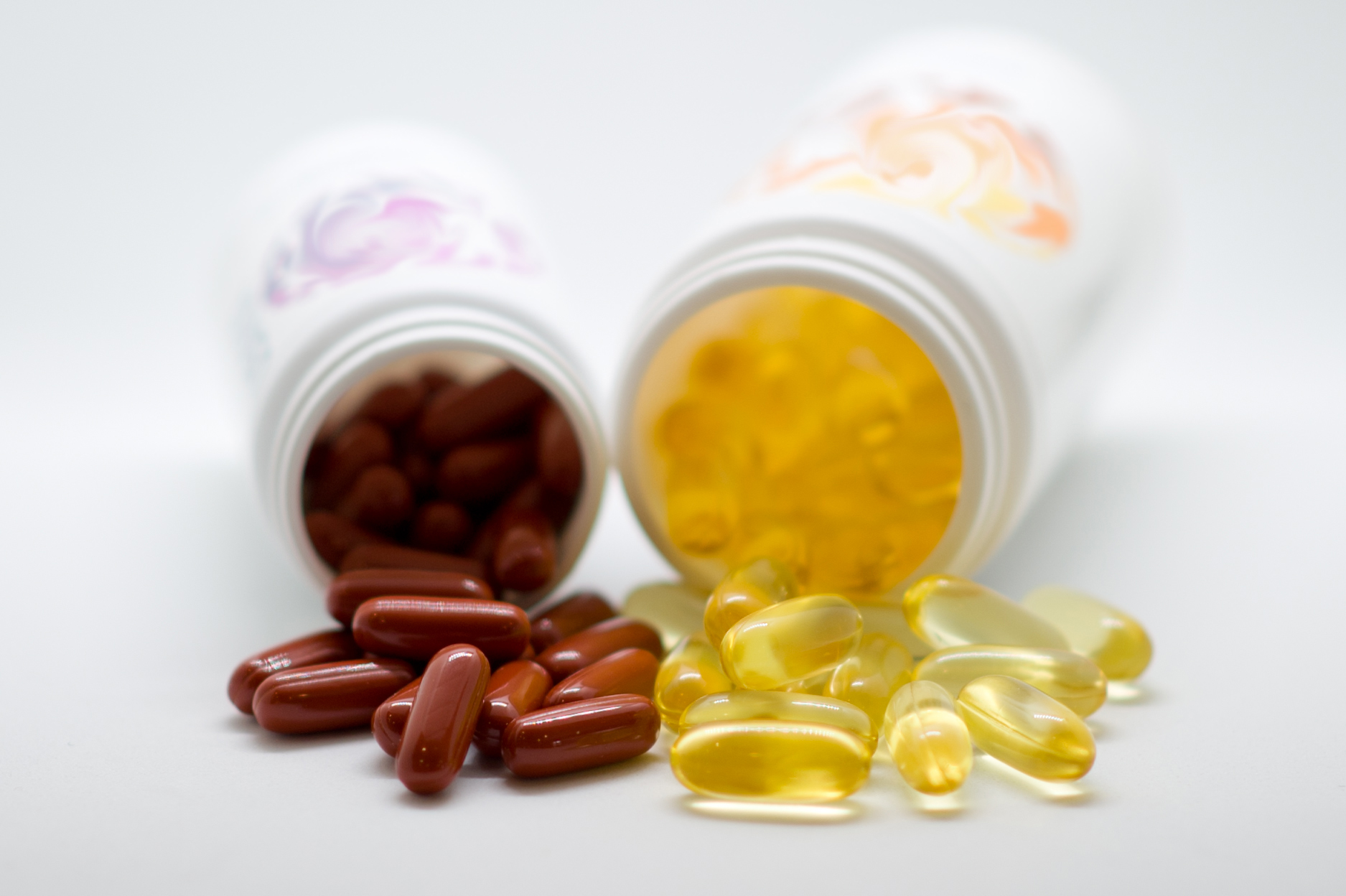 The omega-3 fatty acids, as found in fish oil, are critical for cell, tissue, and organ health, including that of the bowel. The essential fatty acids (EPA and DHA) found in fish oil help reduce inflammation, but more importantly are used to support the immune system and support bowel health.
The omega-3 fatty acids, as found in fish oil, are critical for cell, tissue, and organ health, including that of the bowel. The essential fatty acids (EPA and DHA) found in fish oil help reduce inflammation, but more importantly are used to support the immune system and support bowel health.
In addition to fiber, probiotics, vitamins, minerals, omega-3 fatty acids, and antioxidants, the amino acid L-glutamine is beneficial to the health of the intestinal lining. I often recommend this for healing and gut health. However, this should not be used in place of the other vitamins, minerals, and antioxidants, but as an addition if one so chooses.
Beta Glucans
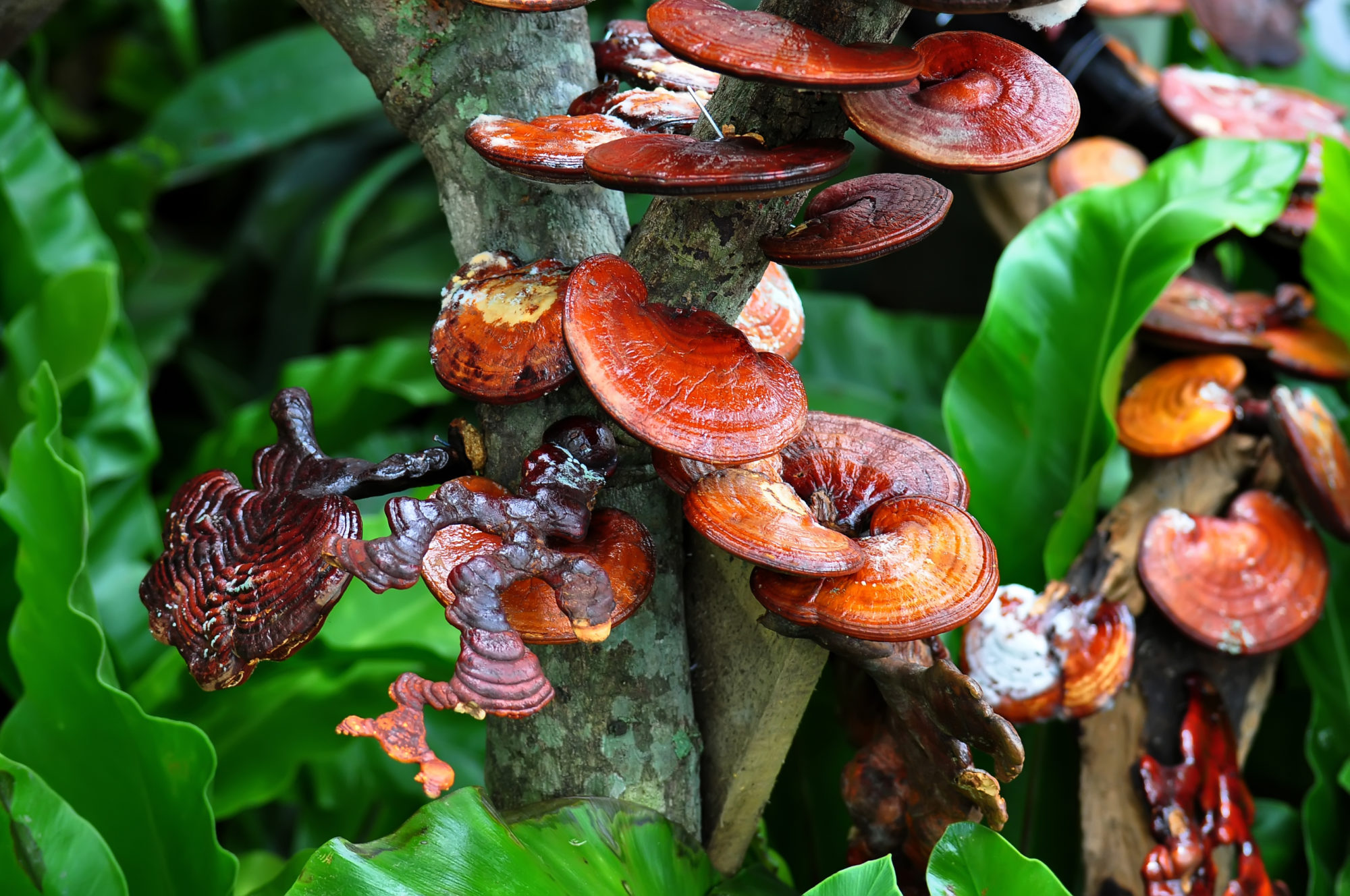 Beta glucans are immune modulators; that is they cause the immune system to mount an active response against foreign microbes and abnormal cells, without triggering an over-reaction that could cause excessive tissue damage. This is why beta glucans are an important part of my diverticulitis supplement protocol.
Beta glucans are immune modulators; that is they cause the immune system to mount an active response against foreign microbes and abnormal cells, without triggering an over-reaction that could cause excessive tissue damage. This is why beta glucans are an important part of my diverticulitis supplement protocol.
Beta glucans are polysaccharide fiber micronutrients derived from the cell membranes of the Reishi and Shiitake mushrooms, as well as baker’s yeast extract. Beta glucans have been used for years in Chinese medicine as immune modulators and cancer fighters. They are safe and powerful micronutrients that help prevent infections, which makes them ideal to be included in my protocols.
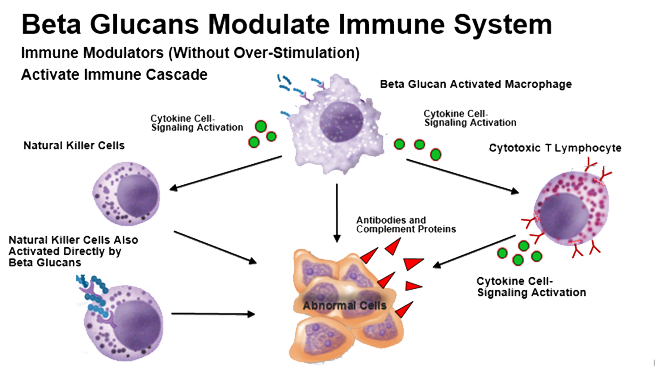
White blood cells, such as macrophages and natural killer cells, have beta glucan receptors, and when stimulated by beta glucans (shown as small chains of blue balls in image below), the cells are activated to precisely attack and eliminate foreign microbes (bacteria, yeast, fungi, and viruses), as well as cancer cells. They cause the cells to release inflammatory cytokines, hormone signals, to mount the defense against microbes. (12 – 15)
To defend against bacterial invasion macrophages, cytotoxic T cells, and natural killer cells are all within the intestinal wall, just under the lining. The large intestine houses the most bacteria, which would kill you if not for the integrity of the intestinal wall and the immune system that defends against any invaders across the intestinal lining.
The gut is intricately involved with the immune system and brain. As in the gut, so goes the rest of the body. Good intestinal health is important for a healthy immune system, metabolism, thinking, and mood. Excessive inflammation in the intestinal lining leads to disseminated inflammation throughout the body’s tissues and organs.
Conclusion
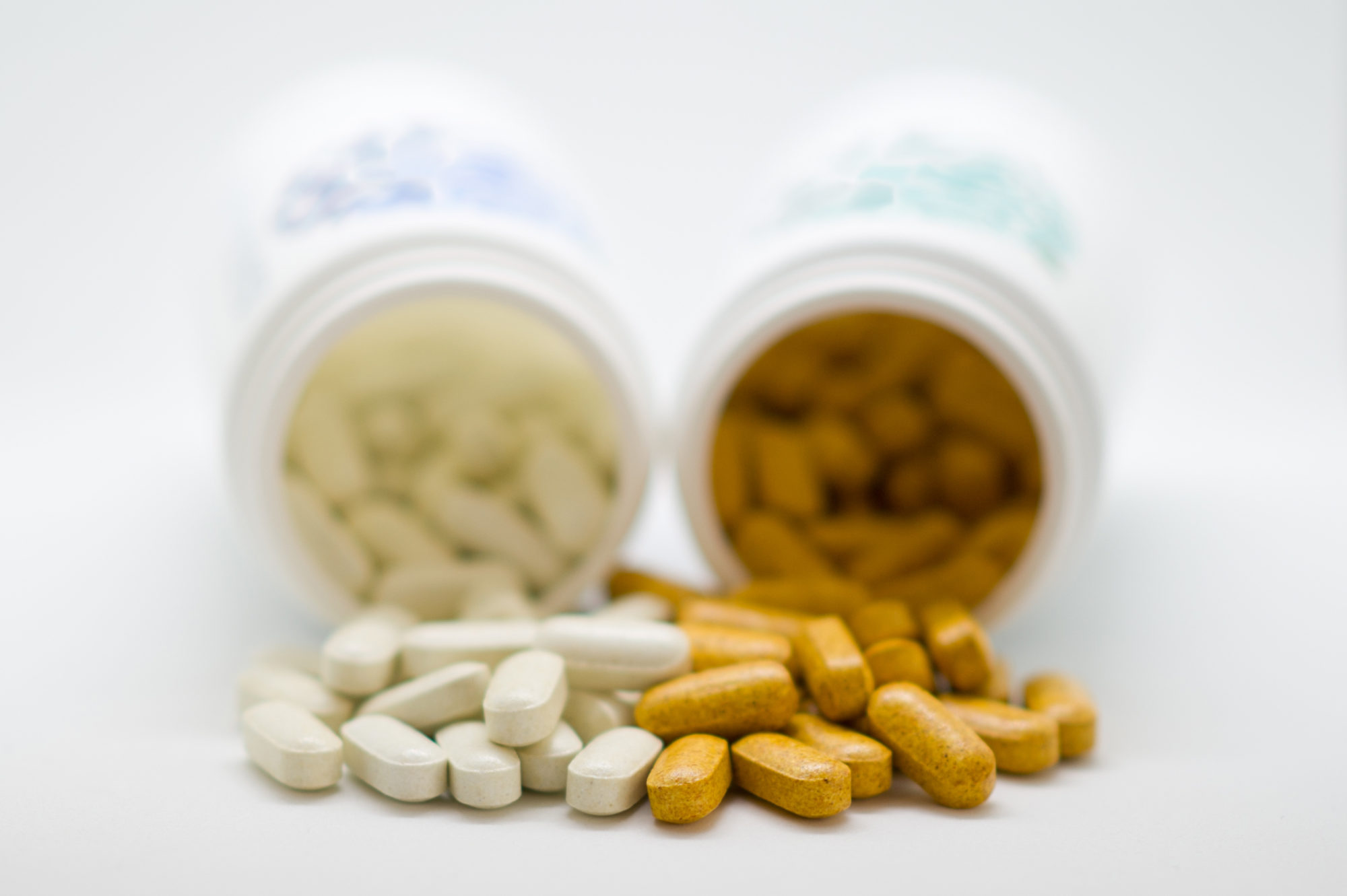 Certainly, supplementing with vitamins, minerals, fish oil (omega 3-fatty acids), and antioxidants is safe. With the research on individual micronutrients, it is easy to extrapolate what the synergistic effect of using a broad spectrum of nutritional supplements would be on gastrointestinal health, as well as overall health. We would expect it to provide better bowel health and fewer episodes of diverticulitis. This is precisely what I have seen among several of my patients, and others with whom I have consulted who were suffering with diverticulitis.
Certainly, supplementing with vitamins, minerals, fish oil (omega 3-fatty acids), and antioxidants is safe. With the research on individual micronutrients, it is easy to extrapolate what the synergistic effect of using a broad spectrum of nutritional supplements would be on gastrointestinal health, as well as overall health. We would expect it to provide better bowel health and fewer episodes of diverticulitis. This is precisely what I have seen among several of my patients, and others with whom I have consulted who were suffering with diverticulitis.
This is how I have developed my protocols, with safety and efficacy being paramount.
I suggest the highest dose one can tolerate of grape seed extract and the liver support supplement. There is no-known toxic dose, within reason, of these ingredients. Meaning, one could take ten times the doses stated on the bottle, and it would not be anywhere near toxic doses. The only side-effect to high doses of certain ingredients such as vitamin C and grape seed extract is watery, or loose stools due to the osmotic pull within the bowel. To avoid this, one need only divide the doses into 3 or 4 times per day.
Inflammation is significantly reduced with the use of these powerful antioxidants. And as opposed to NSAIDs, which reduce inflammation but with toxic side-effects, the antioxidants also assist in healing the tissues.
In addition, the synergistic effect of multiple antioxidants support the immune system and help retard the growth of abnormal bacteria. They truly benefit every cell, every tissue, and every organ of the body.
If a person consistently incorporates a regimen of adequate doses of broad-spectrum, potent and pure micronutrients via supplementation, they can expect to have more energy, less inflammation, less pain, and overall better health. We hope that it means less flare-ups of diverticulitis. One may find this to be the case, especially with daily probiotics, fiber, high doses of the antioxidants, and use of the beta glucans.
Protocol for Diverticulitis and Diverticulosis
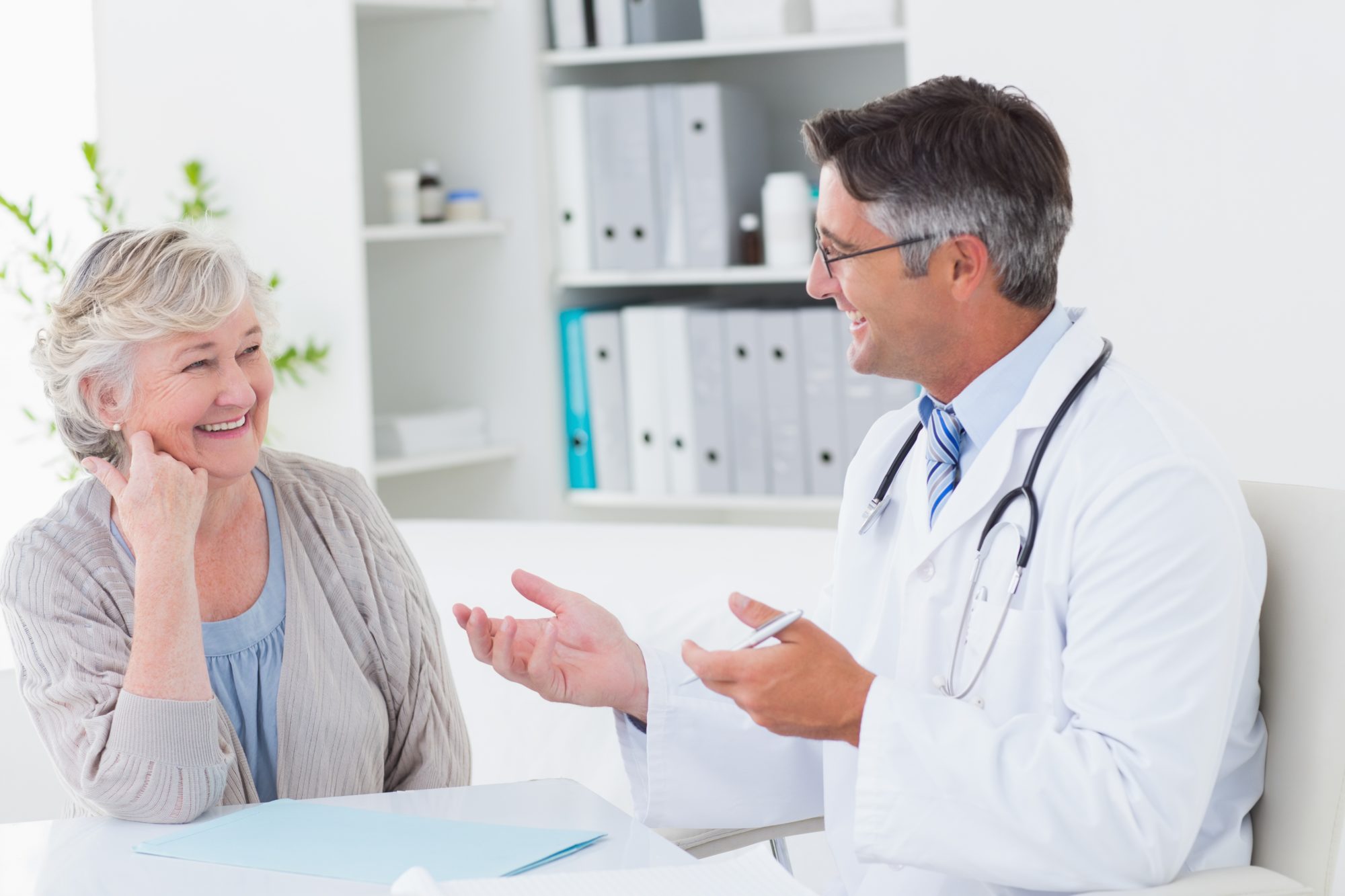 I have included 3 dosage levels based upon a person’s severity of condition, and ability and/or desire to purchase and stay compliant to the protocols. The optimal-dose protocol will obviously provide the greatest benefit in reducing the frequency and severity of diverticulitis flareups. Take the highest dose you are able, according to the protocols below. (Please see medical disclaimer below.)
I have included 3 dosage levels based upon a person’s severity of condition, and ability and/or desire to purchase and stay compliant to the protocols. The optimal-dose protocol will obviously provide the greatest benefit in reducing the frequency and severity of diverticulitis flareups. Take the highest dose you are able, according to the protocols below. (Please see medical disclaimer below.)
Obviously one’s clinical condition must be taken into consideration. The protocols are for those with symptomatic episodes of uncomplicated diverticulitis. The hope is to reduce the episodes of inflammation and infection.
If a person is at risk of serious harm, and must have surgery to avoid rupture and a life-threatening situation, then please do not depend upon these protocols. These protocols are for mild – moderate cases, with the approval of your doctor. There is nothing harmful in these supplements. They cannot do harm. Of course, avoiding surgery when needed can be harmful, and that is the main reason to check with your doctor about whether surgical intervention is needed, or whether you can try dietary changes, fiber, and nutritional supplements to hopefully reduce the flare-ups of inflammation and infection.
The nutritional supplements can be taken even if on antibiotics (such asrifaximin). Just separate the taking of antibiotics from taking supplements by at least two hours so that there is not interference in absorption of either.
The article and protocol are for informational purposes only, and not intended as medical advice. Please read the Medical Disclaimer below, and consult with your personal physician before starting supplements and acting upon any information on this website.
Minimal Protocol for Diverticulitis

Basic Protocol for Diverticulitis
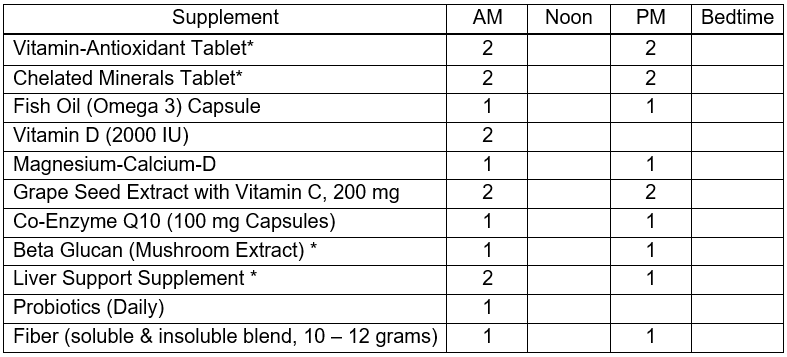
Average Protocol for Diverticulitis
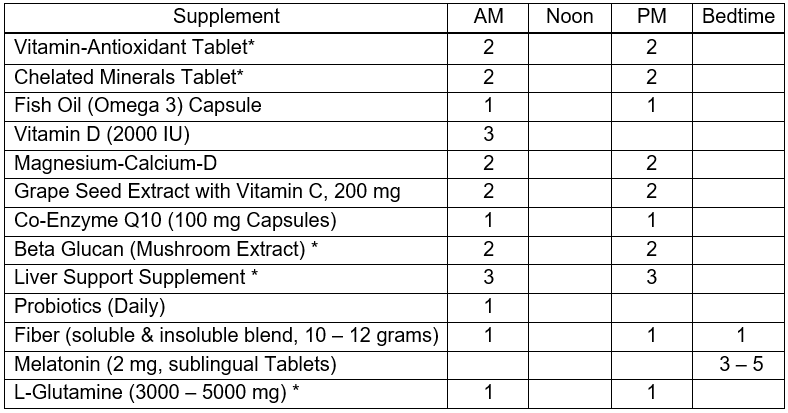
Advanced Protocol for Diverticulitis
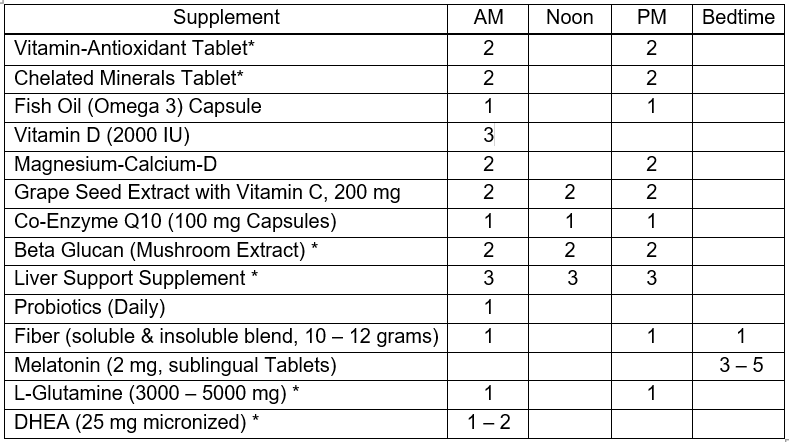
- AM: with, or after breakfast
- Noon: At lunchtime with food, or shortly thereafter
- PM: Late afternoon with food, or at, or after dinner
- Please see my list of ingredients (below) that I like to see provided by a foundational vitamin and mineral supplement.
- Liver support supplement that provides numerous ingredients, including N-Acetyl-L-Cysteine (NAC), turmeric extract (curcumin), green tea extract, olive extract, broccoli extract, alpha lipoic acid, milk thistle extract, and biotin.
- Beta Glucans, derived from the Shiitake and Reishi mushrooms and baker’s yeast extract.
- Fiber with both soluble and insoluble fiber.
- L-Glutamine Powder (250 grams, with using 1 teaspoon = 4000 mg, which is the same as 4 grams, twice daily) can be purchased from Douglas Labs by first creating a customer account by CLICKING HERE. (If this link does not work for you, simply type “douglaslabs.com/patient-account” into a new browser tab.) Please use Referral Code 2074214.
Ingredients that I like to see provided collectively by vitamin-antioxidant & chelated mineral tablets
Vitamin A, mostly as Beta Carotene
Vitamin C
Vitamin D3
Vitamin E
Vitamin K (K1 & K2)
B-Complex Vitamins
Curcumin (turmeric extract)
Quercetin
Green Tea Extract
Olive Extract
Rutin
Resveratrol
Choline
Lutein
Lycopene
N-Acetyl-L-Cysteine (NAC)
Calcium
Magnesium
Iodine (as potassium iodide)
Zinc
Selenium
Copper
Manganese
Chromium
Molybdenum
Including Ultra Trace Minerals
Medical Disclaimer
Information on this website, written, spoken, or in any other communication by Dr. Ladd McNamara or any other information or reference is for informational purposes only. The information provided on this website is a result of years of practice, experience, and study by the author. This information is not intended as a substitute for the advice provided by someone’s personal licensed physician or other healthcare professional, or any information contained on or in any product label or packaging. Do not use the information on this website, or any other form of communication from Dr. Ladd McNamara or the Dr. Ladd VIP Program, for diagnosing or treatment of a health issue or disease, or for the prescribing of medication or the use of supplementation without a discussion with your licensed health professional first. At best, the information provided on this website is only meant to supplement information provided by your own doctor or health professional, not to replace medical advice. The information from this website is not meant to cover all possible uses, precautions, interactions or possible adverse effects of nutritional supplements with or without medications, or in conjunction with specific medical conditions. The information from this website may not fit your specific health circumstances. Never delay seeking medical care or disregard advice from your health care professional because of information you have received directly or indirectly from this website, from the Dr. Ladd VIP Program, or from Dr. Ladd McNamara himself. Always speak with your physician or other healthcare professional before making any changes to your medication or embarking on a nutritional, herbal or homeopathic supplement program, or before using any treatment for a health concern. If you have, or suspect that you have, a medical problem, contact your health care provider promptly. Do not disregard professional medical advice or delay in seeking professional advice because of something you have read or heard on this website, or due to any other information from Dr. Ladd McNamara or his representatives. Information provided on this website or the V.I.P. Program, and the use of any products or services mentioned on this website (or as a result of information provided this program, article, or website) by you DOES NOT create a doctor-patient relationship between you and Ladd McNamara, M.D. Information and statements regarding dietary supplements have not been evaluated by the Food and Drug Administration and are not intended to diagnose, treat, cure, or prevent any disease.
References
- Lahner E, et al. Probiotics in the Treatment of Diverticular Disease. A Systematic Review. J Gastrointestin Liver Dis. 2016 Mar;25(1):79-86
- Wright EK, et al. Recent advances in characterizing the gastrointestinal microbiome in Crohn’s disease: a systematic review. Inflamm Bowel Dis. 2015 Jun;21(6):1219-28.
- Barbara G, et al. Mucosal permeability and immune activation as potential therapeutic targets of probiotics in irritable bowel syndrome. J Clin Gastroenterol. 2012 Oct;46 Suppl:S52-5.
- Ferguson LR, et al. The role of vitamin D in reducing gastrointestinal disease risk and assessment of individual dietary intake needs: Focus on genetic and genomic technologies. Mol Nutr Food Res. 2016 Jan;60(1):119-33.
- Maguire LH, et al. Higher serum levels of vitamin D are associated with a reduced risk of diverticulitis. Clin Gastroenterol Hepatol. 2013 Dec;11(12):1631-5.
- Tursi A, et al. Serum levels of vitamin D are associated with the severity of the endoscopic appearance of diverticular disease of the colon according to DICA classification. J Gastrointestin Liver Dis. 2016 Dec;25(4):567-568.
- Bak MJ, et al. Anti-inflammatory effect of procyanidins from wild grape (Vitis amurensis) seeds in LPS-induced RAW 264.7 cells. Oxid Med Cell Longev. 2013;2013:409321.
- Murakami A, et al. Curcumin combined with turmerones, essential oil components of turmeric, abolishes inflammation-associated mouse colon carcinogenesis. 2013 Mar-Apr;39(2):221-32.
- Wang N, et al. Resveratrol Protects Oxidative Stress-Induced Intestinal Epithelial Barrier Dysfunction by Upregulating Heme Oxygenase-1 Expression. Dig Dis Sci. 2016 Sep;61(9):2522-34.
- Bigagli E, et al. Nutritionally relevant concentrations of resveratrol and hydroxytyrosol mitigate oxidative burst of human granulocytes and monocytes and the production of pro-inflammatory mediators in LPS-stimulated RAW 264.7 macrophages. Int Immunopharmacol. 2017 Feb;43:147-155.
- Göransson G, et al. Low plasma tocopherol levels in patients with gastrointestinal disorders. Scand J Gastroenterol. 1973;8(1):21-5.
- Ali MF, et al. β-Glucan-Activated Human B Lymphocytes Participate in Innate Immune Responses by Releasing Proinflammatory Cytokines and Stimulating Neutrophil Chemotaxis. J Immunol. 2015 Dec 1;195(11):5318-26.
- Huang NN, et al. Canonical and noncanonical g-protein signaling helps coordinate actin dynamics to promote macrophage phagocytosis of zymosan. Mol Cell Biol. 2014 Nov 15;34(22):4186-99.
- Lee DH, Kim HW. Innate immunity induced by fungal β-glucans via dectin-1 signaling pathway. Int J Med Mushrooms. 2014;16(1):1-16.
- Takada Y, et al. Isolation and characterization of baker’s yeast capable of strongly activating a macrophage. FEMS Yeast Res. 2014 Mar;14(2):261-9.
All materials on this website, written, audio, visual, are copyrighted by Ladd McNamara, Inc., and are not to be distributed, duplicated, shared, or posted to any other website or social media (including Facebook, etc.).
As a VIP member, you agree that you will NOT share any written, audio, video, or any other proprietary materials from this website with those in your organization, other associates, or team members; and that you will only share approved articles/protocols and videos with your OWN PERSONAL & IMMEDIATE customers, clients, and prospective customers/clients. Doing so, would result in the loss of your Dr. Ladd VIP membership without a refund.
Thank you for your honesty and integrity.
About the Dr. Ladd VIP Program
There are many more articles on various subjects, as well as videos on health concerns, along with specific nutritional supplement protocols for managing health concerns and disease. Of course, this is all for informational purposes, and not to be taken as medical advice. (See medical disclaimer above.) Please learn more at www.drladdvip.com.
Please read about the benefits of being a Dr. Ladd VIP Member. It is a subscription-based personal program to better your health, energy, and passion for life, and for helping others. This program includes on-going support for yourself, and as you help customers and clients with your health enterprise.
Do you have a need to understand how NUTRITIONAL SUPPLEMENTS can benefit the health of people suffering from any number of chronic diseases; such as Heart Disease, Cancer, Diabetes, Arthritis, Dementia, Lyme Disease, Autoimmune Diseases, and Many More!
- Do you have a need for SUPPLEMENT PROTOCOLS as to what specific supplement combinations to use?
- How about WHY SUPPLEMENTS? How do you chose a QUALITY BRAND?
- Do you have a need to BETTER ASSIST CUSTOMERS in making a good decision?
- How about ON-GOING SUPPORT for ON-GOING QUESTIONS?
- How about YOUR PERSONAL HEALTH, and/or Your PERSONAL RELATIONSHIPS?
Happiness and Health includes not only being free of disease, but passionately engaged in a relationship, in life, and in helping others! It means living with less stress, more fun, and activity.
The Dr. Ladd VIP Program is about Vitality, Intimacy, and Passion, being balanced in all aspects of life, and helping others to get there too.
 Please read more at www.drladdvip.com, and take advantage of the Video Courses, the Supplement Protocols, Articles, Downloadable PDFs, and Dr. Ladd VIP Facebook Community and Support. “Have me in your back pocket” by becoming a VIP Member Today!
Please read more at www.drladdvip.com, and take advantage of the Video Courses, the Supplement Protocols, Articles, Downloadable PDFs, and Dr. Ladd VIP Facebook Community and Support. “Have me in your back pocket” by becoming a VIP Member Today!
If you are not a VIP member, please subscribe to my email list. If you are already a VIP member, no need to subscribe to the email newsletter list. Thank you.
dr. ladd
Please learn more about the Dr. Ladd VIP program here: www.drladdvip.com.
Please Subscribe to Dr. Ladd’s Email List
Receive health and website updates, as well as information on upcoming FREE health-related webinars.
All information, written or video, is copyrighted by Ladd McNamara, Inc., and is not to be shared, duplicated, or posted to other websites or social media platforms without express permissin from Ladd McNamara, M.D. Thank you.
Dr. Ladd’s V.I.P. Program and Website is Owned and Operated by Ladd R. McNamara, M.D. and Ladd McNamara, Inc., a California corporation.
